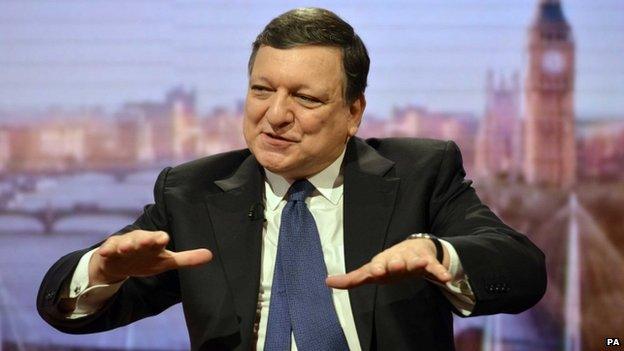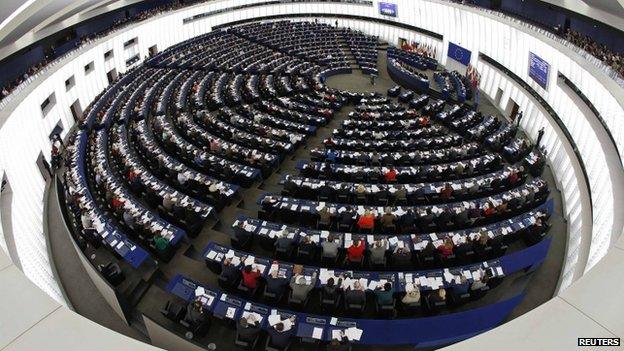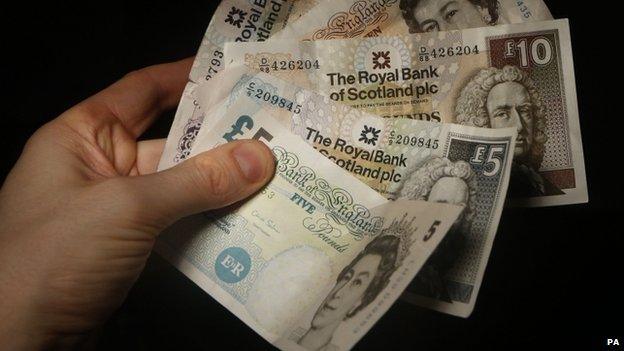Scottish independence: Is EU debate common sense?
- Published
When you hear the phrase "common sense", do you think of the Scottish enlightenment philosophical school associated with Thomas Reid?
Or perhaps the challenging pamphlet of that name by Thomas Paine? Or the tone of the sermons preached by Dean Swift in Dublin during his days off from writing about Lilliput and the Yahoos?
Nicola Sturgeon wants you to think about Scottish independence. She used the phrase repeatedly in countering criticism from opponents at Holyrood.
For Nationalists, Scottish independence is a given.
They regard it as intrinsic to rational thought that the nation of Scotland should be a self-governing state. Why, they ask, would anyone accept anything less?
That matters. It colours the referendum debate. Potentially, it can make advocates of independence somewhat impatient towards alternative viewpoints.
Is not independence simple common sense?

European Commission president, Jose Manuel Barosso said it would be "extremely difficult, if not impossible" for an independent Scotland to secure the agreement of all 28 member states to join the EU.
SNP strategists, of course, are well aware of that potential tendency - and they seek to hold it in check.
They know that, to achieve their objective, they require to convince people who are actively sceptical, disquieted or merely puzzled.
So, when Nicola Sturgeon talked of "common sense", she did so in the context of an external response to an internal Scottish choice; the consequences of independence.
Incidentally, plaudits to the presiding officer for selecting as "topical questions" the referendum issues du jour, the currency and the EU. Seldom has the word "topical" been more accurately applied.
Ms Sturgeon had plainly arrived determined to defend by attacking. Her resolution was unwavering, her tone firm. It was a fine performance.
Asked by Labour's Drew Smith about comments from the European commission president Jose Manuel Barroso - to the effect that Scottish membership of the EU would be difficult, if not impossible, to achieve - Ms Sturgeon was dismissive.

The Scottish government said an independent Scotland would be welcomed as a new EU member
She paused to note two points: that EU accession was a matter for member states, not the commission, and that Mr Barroso was on the way out anyway.
Then she declared that it would be an "absolute affront" to democracy if Scots who had been European citizens for forty years, via the UK, were to be excluded because they had opted for self-government.
It was, she said, an issue that cried out for "common sense". Aha, said Baroness Goldie (as we must now label Bella), but does not that cut both ways?
Was it not equally common sense to concede that member states were able to say no (or non or nein or . . .) to Scottish accession post independence?
This, said Ms Sturgeon, was "scaremongering". No state had actually threatened a veto.
There rose Willie Rennie of the Liberal Democrats. Scotland's clout, he implied, was less than extensive in the EU.
To suggest that Alex Salmond held sway in European capitals was "Napoleonic in its bravado".
There was a momentary pause while the chamber absorbed the image of the first minister as a Scottish Napoleon. But only momentary.
His deputy was in no mood to talk of ancient European strife. Scotland, she said, would be welcome in Europe: with her oil, her marine reserves, her renewable energy.
More and more opposition MSPs lined up to demand the terms of accession - or, more precisely, the "red lines" for the Scottish government?
Were they, inquired Ms Sturgeon, "hard of hearing or hard of understanding"? There need be no concessions.
Still, in the face of this offered "common sense", rival MSPs offered scepticism.
What might go? Signing up to the Euro? Accepting the Schengen treaty on borderless access? Changing the rate of VAT? The answers: no, no and no.

The issue of currency in an independent Scotland also came up in parliament
MSPs then moved to part two, the currency.
If Ms Sturgeon was chilly towards Jose Manuel Barroso, she was positively Antarctic towards George Osborne and what she called his "sermon on the pound".
In vain did Annabel Goldie and others suggest that the sterling zone was a non-starter. Ms Sturgeon was, again, making no concessions.
Labour's Jenny Marra noted the Scottish government had calculated the cost of avoiding a currency zone.
Ministers had said it could amount to some £500m for firms elsewhere in the UK to continue trading with Scotland.
What, she asked, was the comparable cost for Scotland?
Answer came there none (as was the case when a similar question was posed by my esteemed colleague Gary Robertson on Newsnight Scotland last night.)
Ms Sturgeon said that abandoning a currency zone was not Scottish government policy.
Ms Marra merely smiled.